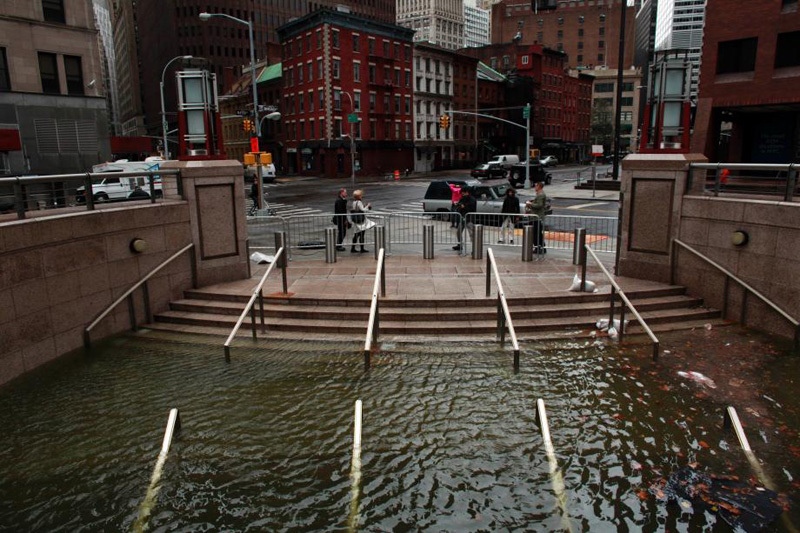In the London Review of Books, Meehan Crist reviews The Water Will Come: Rising Seas, Sinking Cities and the Remaking of the Civilised World by Jeff Goodell. In writing the book, Goodell crisscrossed the globe talking to scientists, politicians, artists, and populations threatened by rising seas. What he discovered is that seas levels may rise much higher than accounted for in the Paris Agreement, and that officials in coastal cities like Miami and Lagos are largely in denial about this. As Crist writes in her review, “There is no longer any doubt that the rise in global sea levels will reshape human civilisation.” Here’s an excerpt:
Jeff Goodell, who has been reporting on climate change for years (his previous books include How to Cool the Planet: Geoengineering and the Audacious Quest to Fix Earth’s Climate and Big Coal: The Dirty Secret behind America’s Energy Future), was also in Lower Manhattan after Hurricane Sandy, and the experience so spooked him that he spent the next four years trying to understand how coastal communities will face the inevitable rise in sea levels. Goodell travels from Norfolk, Virginia to the waterparks of Rotterdam, talking to scientists, politicians, architects, artists, refugees and people living at the waterline, where regular flooding is already a fact of life. He wades barefoot through the polluted waters that flood Miami Beach during king tides, visits a family living in the ‘blackwater slum’ of Makoko, just outside Lagos, and interviews Barack Obama during his historic trip to Alaska. The book skips along with the brisk pace of magazine journalism – some of the chapters first appeared in a different form in publications such as Rolling Stone – and Goodell finds people with visionary plans, dubious schemes and heads planted deep in shifting sands. Most of the time, he is an observer rather than a polemicist, but his profound concern resonates throughout, as when he asks Obama: ‘How do you gauge how much truth America can take? Because you know what’s coming.’ This is a soggy, saturated book. Everywhere Goodell goes, the water is rising. ‘For anyone living in Miami Beach or South Brooklyn or Boston’s Back Bay or any other low-lying coastal neighbourhood,’ he writes, ‘the difference between three feet of sea level rise by 2100 and six feet is the difference between a wet but liveable city and a submerged city … The difference between three feet and six feet is the difference between a manageable coastal crisis and a decades-long refugee disaster.’
This isn’t the first time in human history that global sea levels have risen dramatically in a short period of time. Archaeological evidence shows that when glaciers melted and sea levels rose at the end of the first Ice Age, humans living along coastlines packed up their communities and moved inland. But today’s coastal infrastructure is far less mobile. ‘There’s a terrible irony in the fact that it’s the very infrastructure of the Fossil Fuel Age – the housing and office developments on the coasts, the roads, the railroads, the tunnels, the airports – that makes us most vulnerable,’ Goodell writes. Major airports such as JFK and San Francisco International are likely to be underwater within a hundred years. The eastern coast of the UK will be altered for ever. Florida’s Turkey Point nuclear reactor, which sits perched on an exposed island in Biscayne Bay, is a disaster waiting to happen. Trillions of dollars’ worth of infrastructure and entire coastal economies have been built on land that will soon be flooded, and that’s without taking into account the road erosion, beach erosion and coming property collapse along coastlines, which could trigger economic plunges deeper than the Great Recession. Today, more than 145 million people around the world live three feet or less above sea level, many in poor countries in the global South. ‘As the waters rise,’ Goodell writes, ‘millions of these people will be displaced, many of them in poor countries, creating generations of climate refugees that will make today’s Syrian war refugee crisis look like a high school drama production.’ There is no longer any doubt that the rise in global sea levels will reshape human civilisation.
Image: Flooding in Lower Manhattan after Hurricane Sandy, 2012. Via johnnydepp-zone.com.
